Seville Testimonials
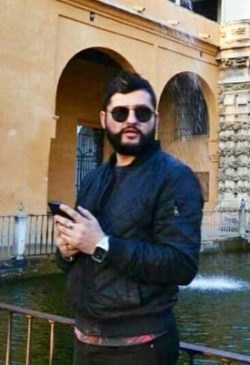
The Study Abroad Program in Seville is super beneficial for students. The two main achievements when studying abroad are: the master of the Spanish language skills and competence, and the increase in self-confidence when speaking and socialize in the different living aspects in Spain.
Gilberto Garcia
Instructor
My students picked up Spanish very quickly in this total immersion program. All of them returned to Lubbock with at least an intermediate speaking level, a tremendous confidence boost with their speaking abilities, and with their Spanish language requirement fulfilled. We went on several TTU Center trips including a week-long tour through southern and central Spain. We also went on various excursions which included: an olive oil factory, a winery tour, several castles, art museums, ruins, a 17th century theatre, and the burial sites of historical figures. The most memorable experiences for my students were moments when they became locals while participating in ongoing Sevillian activities such as dancing Las Sevillanas in La Feria de Abril, following the pasos during Semana Santa, and even simply speaking Spanish with locals while eating tapas.
Dora Aranda
Instructor
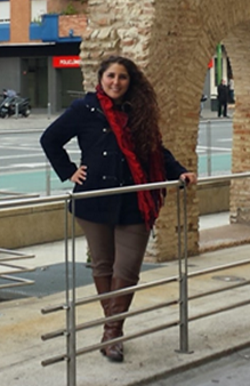
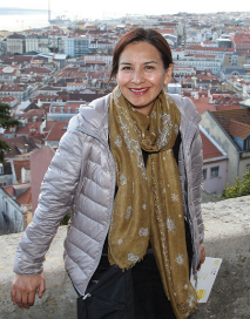
Leading students abroad: A wonderful teaching journey
Our Spanish program at the TTU Seville Center has it all. A wonderful city with a soul, a building we can call our own, professional in-situ staff and great pedagogical resources for students and instructors alike. Through daily classes, weekend excursions, and a myriad of effective cultural activities, I have had countless positive interactions with each participant student, some of which I remain touch with to this day.
I am convinced the participant students benefit greatly from studying abroad as they return to the U.S.
Sara Guengerich
Associate Professor
The student experience in Seville is about learning through relationships with other people and their environment at-large. The social, relational dimension of the learning process is constant and rewarding. Learning Spanish or about any academic subject is enormously enlivened by the relationships that students build with each other, their instructors, their host families, and even with the streets and buildings they encounter each day.
Language-learning and travel in this planned, focused format are perhaps the best ways of expanding worldview and also, give us an edge when seeking employment.
Zach Brandner
Instructor
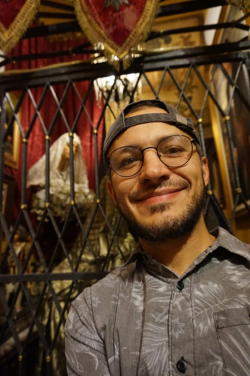
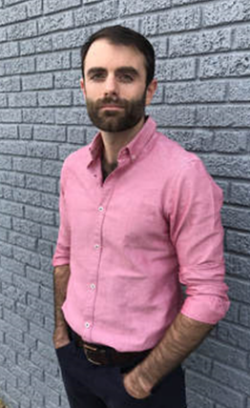
During the study abroad experience in Sevilla students are active participant observers of cultural, linguistic, and pragmatic differences. Students are guided to think beyond the language itself by analyzing nuanced socio-pragmatic differences, such as something as simple as ordering un cafelito ‘a coffee'.
So many aspects of our day-to-day communication and interactions are taken for granted as “normal” (or even universal), but when they are contrasted with a different culture that conducts things slightly differently (neither better nor worse, simply different), this allows each student to reflect critically on their own culture often for the first time.
Studying abroad in Sevilla is as much about learning about the language, history, culture, and people of Andalucía as it is about learning about one's own language, history, culture, and people.
Brendan Regan
Assistant professor
Students have the possibility to improve their ability to communicate in Spanish by interacting with their host families and locals. Students become more intercultural aware as they are leaving away from home and this experience prepares them personally and professionally for the future. At the same time, they make connections for life with their own classmates at the satellite campus, as well as with language assistants and tutors.
What I will more fondly remember is their fascination as we traveled to several cities in Spain and their appreciation of different architectural styles, foods, costumes, and even linguistic differences that they would start to notice.
Gema Vela
Instructor
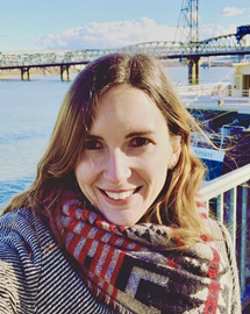
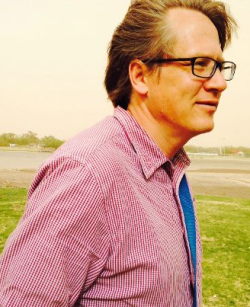
For me, the experience of studying abroad is so wonderful that it should be mandatory for all students before they graduate. I regularly teach at the TTU Seville Study Abroad Center and have seen how the experience is so transformative for my students. Most notably, the Fall and Spring program gives the opportunity to do internships in fields related to one's professional interests. I have students who have taught children at a local elementary school, worked as administrators in a hospital, or served as physical therapy assistants at a nursing home. Having studied abroad is a great plus on anyone's resume. But having actually done an internship in a field related to one's profession is invaluable and something that sets TTU's Seville program apart.
John Beusterien
Professor
Beyond its plazas, cafes, and architecture, the city offers a rich public culture. It is one of the most enchanting cities in Spain. It has ignited the imagination of travelers, artists, and scoundrels across the centuries: from the times of the Romans to the present day. It is also a place of contrasts where the past coexists with the present, where Christianity interacts with Islam, where tradition clashes with change. You can read about places like this in books, like I did, but it is no substitute for first-hand experience. The Sevilla you will get to know and experience is different and more exciting than the Hispalis tourists see.
I believe study abroad can play a pivotal role in students' personal and intellectual growth. It provides them the opportunity to move outside their comfort zone, it sparks their curiosity, allow them to gather new knowledge and experiences, question their assumptions, and push them to rethink their place in a more interconnected world.
George Cole
Associate Professor
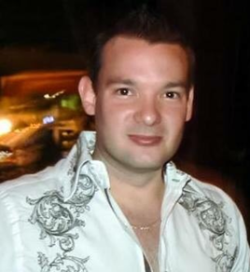
Emily
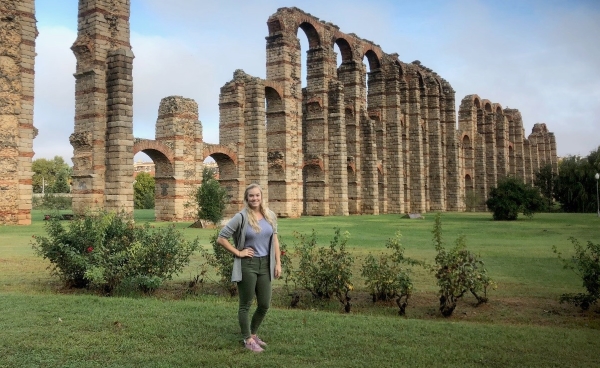
Remains of a Roman Aqueduct in Mérida, Spain
My name is Emily and I would like to tell you about my experiences at TTU Seville Center.
Studying abroad at the TTU center in Seville, Spain was the best decision I ever made. It was fun, educational, and an experience of a lifetime. However, be warned; studying abroad is not all rainbows and sunshine; you have classes and papers and homework just like everyone else. Prior to going to Seville in the fall semester, I had taken a 2000 level Spanish class in the summer. In Spain, I took two 3000 level and two 4000 level classes. I'm not going to lie: these classes were tough! The work was both demanding, time intensive, and built off the previous level classes. But I succeeded! For me, the key to doing well in the classes was to stay on top of everything. Write down every assignment due date, start it several days in advance, and proofread my work several times. Leave time for your brain to take a break and come back later with fresh eyes. Organization is important if you not only want to do well in your classes, but also have enough stress-free time to explore your city.
As far as finances you need to be prepared for how much money you'll spend. Yes, there are scholarships available. However, even if you get your whole program covered, there are a lot of other expenses you need to save for, especially if you want to travel and see other places in Europe. You need to think about transportation and housing; souvenirs and new clothes aren't always cheap either. The night life is amazing; however, that also costs money and can add up quickly. My advice to you is to budget accordingly. I set myself a weekly money allowance and made sure to stick to it. This ensures a great time and less stress when you're approaching the end of the semester.
Jordan
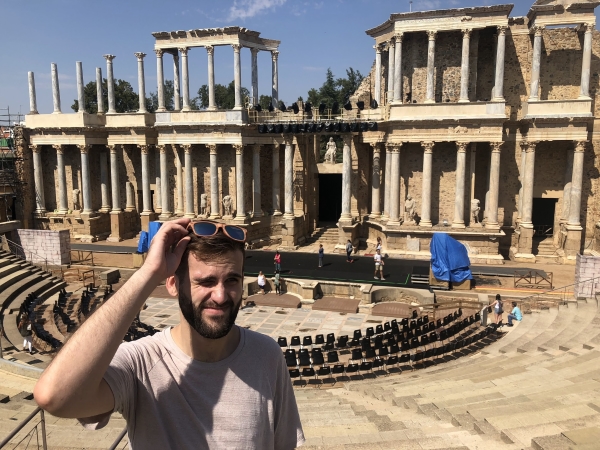
Roman remains at Mérida, Spain
¡Hola a todos!
My name is Jordan and I'm an alumni of the fall 2018 cohort at the TTU Center in Sevilla. It is my intent to help address any questions or concerns you may have about the program by telling you a little about my experience. I've also included my email at the end in case you'd like to personally ask me questions!
Academic Experience
I took 12 hours of upper-level Spanish courses, which were made up of an advanced grammar, culture, literature, and internship course. The workload was similar to a normal semester in Lubbock, although it sometimes felt lighter because of the emphasis on the participation grades that came from excursions and conversation nights with local Sevillanos, our college-age Spanish tutors.
There were also many organized excursions through the TTU Center to a variety of places within Spain, such as a day trip to Córdoba, a weekend in Granada, or several days in Madrid. Often the professors had planned times for us to visit certain sites as a group and then left us some free time for exploring on our own afterwards. There were also moments where they'd take us through a particular neighborhood to teach us about Spanish culture afterwards.
In fact, one of my favorite parts about my academic experience was the professors of the program, as they dedicated a lot of time and resources to me. For example, on the first day of the culture and literature classes, my professor took a moment to interview each of us individually to talk about our goals and interests. When it came to my turn, I told her about my goals to learn and use as much Spanish as possible, but that I also was a musician in a tango band. After a few emails, I was then connected with an instructor of Argentine tango. As a result, not only did my professor help me find a way to follow my interests, but she also had connected me with people who I could (and did) practice my Spanish with every Monday night. Oh... and it was an excellent way to meet locals!
Words of Wisdom #1: If your professor(s) recommends you a good tapas bar, say yes.
Lifestyle and Social Experience
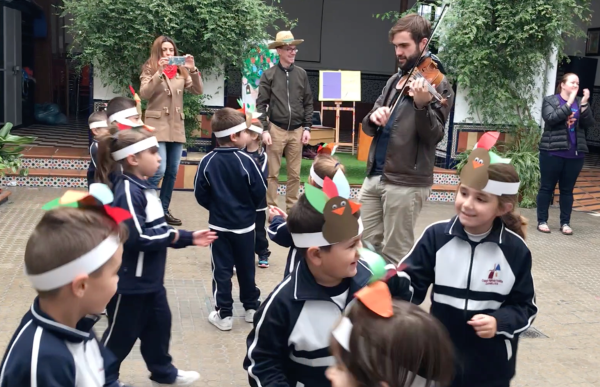
Internship activities with elementary school-age children
It is my firm opinion that there could not be a more beautiful lifestyle than one that includes siesta, the Spanish tradition that many outsiders simply see as taking a nap in the middle of the day. However, the truth is that the siesta tradition is not just a literal nap, but rather the manner in which many Andalusians approach their afternoon. First of all, in case you didn't know, southern Spain has some of the hottest summers, so it's a way for people to get out of the heat and operate their business during cooler hours. Secondly, it's a time to eat lunch, which is the most important meal of the day for Spaniards. As I found with my personal host family and from my Spanish friends, it's also a time to spend with family, usually while watching the Simpsons or a soccer game in the background.
For myself, the siesta lifestyle was a major way that I got to speak to my host family. After my mom had prepared the best food, ranging from typical dishes to Italian pizza, we would all sit down and eat while watching tv and talking. Originally, we would watch the news, but once they bought their first SmartTV, I showed them Netflix and we picked the series "Allí Abajo" to watch together. However, there were also times my host mom would just start singing flamenco music and I'd join her with the palmas or dance. It was just a level of pure carpe diem that I had never experienced. Then, after a filling lunch, I'd often go to my room or stay in the living room to take my well-earned siesta nap.
Typically, after the siesta hours, if there wasn't any homework to do, I'd either go out working on practicing my Spanish or hang out with my host family. While occasionally I would hang out with some of my colleagues from my classes, I made an effort to really branch out and meet other Spaniards. One of the best ways to acquire a second language is to immerse yourself in it, and so that's what I set to do a majority of the time. Whether it meant going to one of the many tapas bars, visiting some of the many cool sites within Sevilla, or taking a solo excursion away from the city (such as Mérida, Santiago de Compostela, and Barcelona), I worked daily on meeting new people and using my Spanish.
If you're someone going to Seville to work on your Spanish, here's one catch: many Spanish people want to practice their English. For students who may be too nervous to practice their Spanish, this might be appealing, but for me it was frustrating. There were many times I wasn't given the chance to speak in Spanish when I went out because the camarero taking my order or the caballero on the stool next to me knew that I was from the United States. However, I kept trying, and was forward in saying that I wanted to speak only in Spanish. Good news was that since the Spanish people are generally direct people, most of the times this would do the trick.
Words of Wisdom #2: Unlike most of us United States citizens, the Spanish are extremely direct people. Embrace it.
Costs and Scholarships
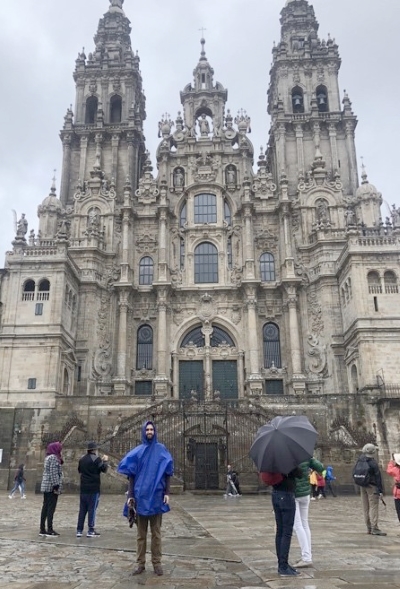
Traveling within Spain: Santiago de Compostela Cathedral and Main Pilgrimage Site
Let me be frank: it was expensive. There are going to be fees and such that your neither your professors, advisors, nor friends can predict. I don't care how stubborn you might be to save money while you're there: you're going to go out when you didn't plan on it, you're going to take a taxi (or two) you didn't plan on taking, you're going to buy something impulsively... it happens to even the most frugal of people. Consequently, I'd plan to carry an extra $1000 minimum if you go. I think this is a sufficient amount for going out, perhaps taking a trip outside of Seville, and souvenirs.
However, while yes it was expensive, it was the best money I've spent to this day. No one can ever explain to you how life-changing it is to go abroad, and so you'll have to trust them when they say that and discover it for yourself.
Words of Wisdom #3: If you go abroad, don't deprive yourself of experiences of a lifetime. If it means you spend an extra $100 in order to take a weekend trip to Germany, you do it. When else are you ever going to be in a situation for a weekend trip to Paris or London to be easy both timewise and moneywise?
Shocker: I had more than half of my semester paid for in scholarships. One of the financial benefits of going during the semester versus the summer is that there are more scholarships available (particularly in the Fall). Once I had set to go abroad, I spent hours researching for scholarships, and then spent what could have been days writing and re-writing my essays.
For me, $8,000/$15,500 was paid for in scholarships. For others, maybe only $4,000/$15,500 was paid for in scholarships. It's not unheard of either for some people to finance their study abroad solely in scholarships! My point is, if you put in the effort, you can make the experience cheaper than you might've thought!
In regards to particular scholarships, TTU has many to offer, although it depends on the program and term for how much is available. These are the safest scholarships to apply for, as you're more likely to get these than a non-TTU scholarship. However, I also applied to four other scholarships, two of which I received. Again, I spent hours not only working on essays by myself, but having them critiqued at the TTU University Writing Center. Needless to say, all of the hard work paid off.
Words of Wisdom #4: Many scholarships are going to ask you to write about the same topics more or less, so write 1-2 essays to the best of your ability and review them at the university writing center every week until you're picking at the smallest details. After this, you'll likely have something you can use for other scholarships (or at the very least, thank you letters).
Overall
As I said before, it's impossible to tell you how life-changing this program was for me. What I can tell you is that I did learn a lot of Spanish, I did go out and travel, and I did make it more affordable with financial aid. Whether or not the experience goes the same for you likely depends on your willingness to work hard, be open to new experiences, and seeking out the resources you need.
I hope my story has inspired you to consider taking that step to study abroad in Sevilla! If you have any questions about the program, the experience, or would like advice on certain problems you're anticipating, please email me at jordan.kirksey@ttu.edu.
Jessica
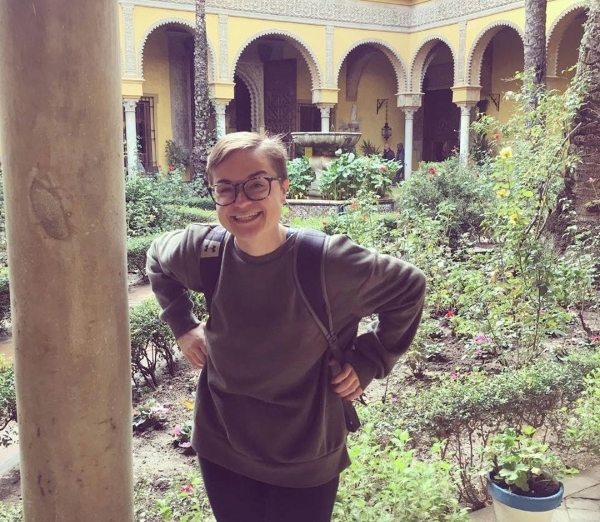
The Palacio de las Dueñas in Seville, Spain
Hello, my name is Jessica and I studied abroad in Sevilla, España in the Fall 2018 with Texas Tech, and it was truly a once in a lifetime experience. Before going to Spain my biggest fears were that I wouldn't be able to understand anybody. I also feared that I wouldn't like my host family situation. Yet, within a week in Spain I could already understand my host Mother easier, and by the end of the semester I could have a full gossip session with her "sin problemas". My host parents were the best, they made me feel like I was part of their family, and I felt like I was home with them. My biggest fears ended up being the best parts of my study abroad experience. If you're considering studying abroad, don't let your fears hold you back.
¡Sí, se puede!
CMLL Spanish Program
-
Address
CMLL Building, 2906 18th St, Lubbock, TX 79409 -
Phone
806.742.3145
